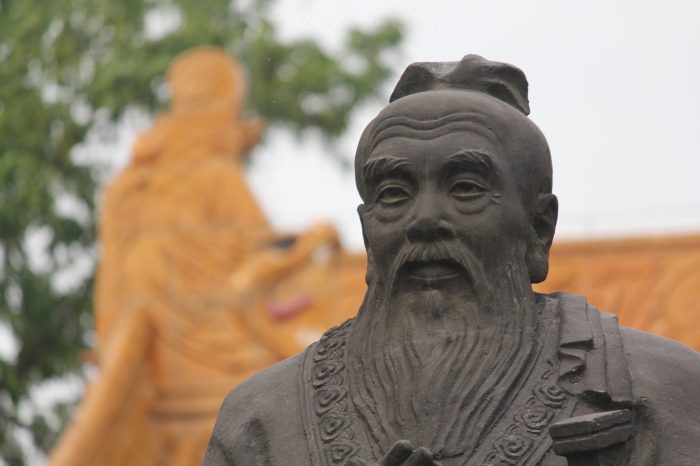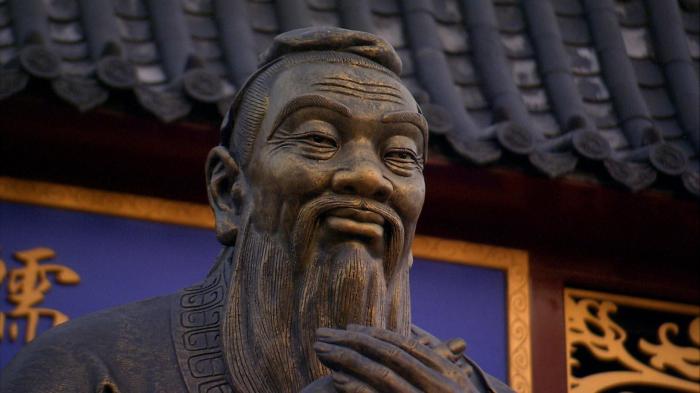Religion native to china crossword – Embark on an enlightening journey into the realm of religion native to China, a topic that has captivated crossword enthusiasts and scholars alike. From the enigmatic origins of Confucianism to the profound teachings of Buddhism, this exploration unveils the intricate tapestry of beliefs, practices, and cultural influences that have shaped the spiritual landscape of China.
Prepare to delve into the major religions that have flourished on Chinese soil, including Confucianism, Daoism, and Buddhism. Discover their unique tenets, rituals, and geographical distribution, gaining a deeper understanding of the diverse religious traditions that have enriched Chinese civilization.
Origins of Religion Native to China: Religion Native To China Crossword

The religious traditions native to China have a long and rich history, dating back to ancient times. These religions have been shaped by the unique cultural and philosophical landscape of China, and they continue to play an important role in the lives of many Chinese people today.
The earliest forms of Chinese religion were animistic, with people believing in the existence of spirits that inhabited the natural world. Over time, these beliefs evolved into more organized religious systems, such as Confucianism, Daoism, and Buddhism.
Chinese culture and philosophy have had a profound influence on the development of these religions. Confucianism, for example, emphasizes the importance of social harmony and respect for authority, while Daoism stresses the importance of living in harmony with nature.
Major Religions Native to China

The major religions native to China are Confucianism, Daoism, and Buddhism. These religions have been practiced in China for centuries and have had a significant impact on Chinese culture and society.
- Confucianism: Confucianism is a philosophy and ethical system that was developed by the Chinese philosopher Confucius in the 6th century BCE. Confucianism emphasizes the importance of social harmony and respect for authority. It also teaches that people should strive to live a virtuous life.
- Daoism: Daoism is a philosophy and religion that was developed in China in the 4th century BCE. Daoism teaches that the universe is governed by a force called the Dao. The Dao is the ultimate reality and the source of all things.
Daoists believe that people should live in harmony with the Dao.
- Buddhism: Buddhism is a religion that was founded by the Indian prince Siddhartha Gautama in the 6th century BCE. Buddhism teaches that the goal of life is to achieve enlightenment and escape the cycle of rebirth. Buddhists believe that the Buddha is the supreme being and that his teachings can lead to enlightenment.
Confucianism
Confucianism is a philosophy and ethical system that was developed by the Chinese philosopher Confucius in the 6th century BCE. Confucianism emphasizes the importance of social harmony and respect for authority. It also teaches that people should strive to live a virtuous life.
The key tenets of Confucianism include:
- Ren: Ren is the virtue of benevolence or love. It is the highest virtue in Confucianism and is the foundation for all other virtues.
- Yi: Yi is the virtue of righteousness or justice. It is the duty of all people to act in accordance with yi.
- Li: Li is the virtue of propriety or etiquette. It is the way that people should behave in order to maintain social harmony.
- Zhi: Zhi is the virtue of wisdom or knowledge. It is the duty of all people to seek knowledge and to use it for the benefit of society.
Daoism
Daoism is a philosophy and religion that was developed in China in the 4th century BCE. Daoism teaches that the universe is governed by a force called the Dao. The Dao is the ultimate reality and the source of all things.
Daoists believe that people should live in harmony with the Dao.
The key tenets of Daoism include:
- Wu wei: Wu wei is the principle of non-action. It is the belief that people should not interfere with the natural order of things. Instead, they should let things happen naturally.
- Zi ran: Zi ran is the principle of spontaneity. It is the belief that people should live in accordance with their natural instincts.
- Pu: Pu is the principle of simplicity. It is the belief that people should live a simple life, free from unnecessary desires.
Buddhism in China
Buddhism is a religion that was founded by the Indian prince Siddhartha Gautama in the 6th century BCE. Buddhism teaches that the goal of life is to achieve enlightenment and escape the cycle of rebirth. Buddhists believe that the Buddha is the supreme being and that his teachings can lead to enlightenment.
Buddhism was introduced to China in the 1st century CE. It quickly spread throughout the country and became one of the most popular religions in China. Today, there are an estimated 200 million Buddhists in China.
The major schools of Buddhism in China are:
- Chan Buddhism: Chan Buddhism is a school of Buddhism that emphasizes meditation and the direct experience of the Dao.
- Pure Land Buddhism: Pure Land Buddhism is a school of Buddhism that emphasizes devotion to the Buddha Amitabha and the belief that rebirth in the Pure Land is the path to enlightenment.
- Tiantai Buddhism: Tiantai Buddhism is a school of Buddhism that emphasizes the study of the Lotus Sutra and the belief that all beings have the potential to become Buddhas.
Chinese Folk Religion, Religion native to china crossword
Chinese folk religion is a collection of beliefs and practices that have been passed down from generation to generation in China. Chinese folk religion is not a single, organized religion, but rather a collection of local beliefs and practices that vary from region to region.
The beliefs of Chinese folk religion include:
- Belief in spirits: Chinese folk religion believes in the existence of spirits that inhabit the natural world. These spirits can be good or evil, and they can influence the lives of humans.
- Belief in deities: Chinese folk religion also believes in the existence of deities. These deities are often associated with specific natural phenomena, such as the weather or the harvest.
- Belief in ancestors: Chinese folk religion believes that the spirits of ancestors continue to exist after death. These ancestors can influence the lives of their descendants, and they are often worshipped as gods.
Clarifying Questions
What is the oldest religion native to China?
Confucianism, which originated in the 6th century BCE.
What is the main principle of Confucianism?
Ren, or benevolence, which emphasizes respect for others and harmonious relationships.
What is the Dao in Daoism?
The ultimate reality or principle that governs the universe, often translated as “the Way”.